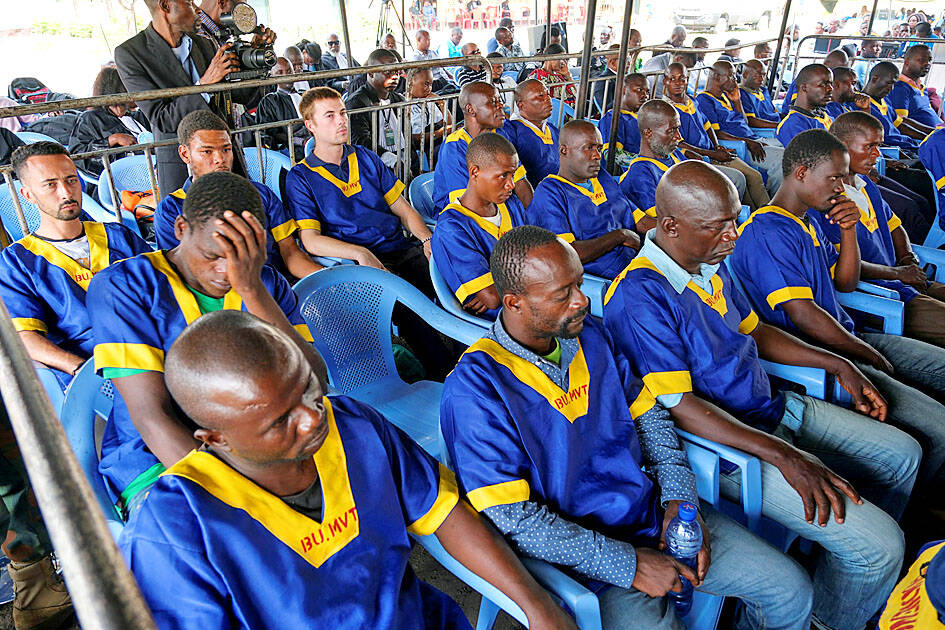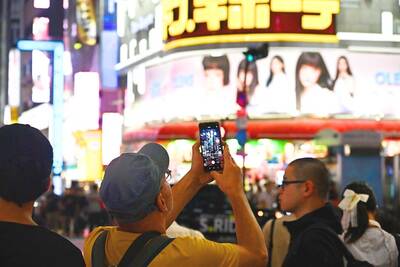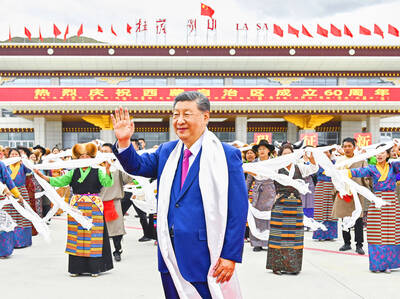Three US citizens were among 37 people sentenced to death in the Democratic Republic of the Congo (DR Congo) on Friday over what the army says was a coup attempt.
The court in Kinshasa remained silent as the verdicts were read, with defendants dressed in blue and yellow prison uniforms and seated on plastic chairs, their faces somber.
Death sentences were also handed down to a Belgian, Briton and Canadian, all naturalized Congolese.

Photo: Reuters
“The court pronounces the harshest sentence: the death penalty,” court president Freddy Ehume said in concluding the trial of 51 people that began in early June.
Lawyers for the defence said they intended to appeal, calling it a “shameful decision taken in bad faith.”
Several human rights groups have also said the trial proceedings were not transparent.
The alleged coup attempt unfurled in the early hours of May 19 when several dozen armed men attacked the home of then-DR Congo Minister of Economy Vital Kamerhe, who is now the DR Congo National Assembly president. Two policemen guarding him were killed.
All but one of those sentenced to death were found guilty of criminal association, attack and terrorism.
Fourteen defendants were acquitted, with the investigation showing they had “no connection” with the events, the court said.
The hearing began early in the afternoon under a tent in a courtyard of the Ndolo military prison in Kinshasa.
The Belgian, military expert Jean-Jacques Wondo, ahead of the trial said that he hoped to be acquitted and that he was having a “difficult ordeal.”
During the alleged coup attempt, the armed men also went to a building housing DR Congo President Felix Tshisekedi’s offices brandishing flags of Zaire, the country’s name under former dictator Mobutu Sese Seko, who was overthrown in 1997.
Shots were heard near the building, several sources said at the time.
An army spokesman later announced on national TV that defence and security forces had stopped “an attempted coup d’etat.”
The alleged plot was led by Christian Malanga, a Congolese man who was a “naturalized American” and who was killed by security forces, DR Congo army spokesman General Sylvain Ekenge has said.
The three Americans on trial include Malanga’s son, Marcel Malanga.
The two other Americans being tried are 22-year-old Tyler Thompson and Benjamin Zalman-Polun, 36.
US Department of State spokesman Matthew Miller on Friday said that “embassy staff have been attending the proceedings and will continue to follow the developments.”
The trial began on June 7 at the Ndolo military prison, where all the defendants were being held.
The proceedings have shed little light on the motivations behind the May 19 events, for which the defendants placed the blame on Christian Malanga.
Thompson told the court he had been “forced” into participating, as did the two other US citizens.
“I was forced to carry an arm,” Thompson said.
“I came to the DRC to visit Marcel’s family who I had never seen before,” he added.
Malanga said his father had “told us he would kill us if we didn’t listen,” and Zalman-Polun said he was “kidnapped” and “forced” into taking part.
Last month, DR Congo military prosecutor Lieutenant Colonel Innocent Radjabu urged judges to sentence to death all but one of the defendants, who according to a medical report has “psychological disorders.”
In March, the DR Congo government defied criticism from human rights organizations and lifted a moratorium on the death penalty in place since 2003.

Ten cheetah cubs held in captivity since birth and destined for international wildlife trade markets have been rescued in Somaliland, a breakaway region of Somalia. They were all in stable condition despite all of them having been undernourished and limping due to being tied in captivity for months, said Laurie Marker, founder of the Cheetah Conservation Fund, which is caring for the cubs. One eight-month-old cub was unable to walk after been tied up for six months, while a five-month-old was “very malnourished [a bag of bones], with sores all over her body and full of botfly maggots which are under the

BRUSHED OFF: An ambassador to Australia previously said that Beijing does not see a reason to apologize for its naval exercises and military maneuvers in international areas China set off alarm bells in New Zealand when it dispatched powerful warships on unprecedented missions in the South Pacific without explanation, military documents showed. Beijing has spent years expanding its reach in the southern Pacific Ocean, courting island nations with new hospitals, freshly paved roads and generous offers of climate aid. However, these diplomatic efforts have increasingly been accompanied by more overt displays of military power. Three Chinese warships sailed the Tasman Sea between Australia and New Zealand in February, the first time such a task group had been sighted in those waters. “We have never seen vessels with this capability

A Japanese city would urge all smartphone users to limit screen time to two hours a day outside work or school under a proposed ordinance that includes no penalties. The limit — which would be recommended for all residents in Toyoake City — would not be binding and there would be no penalties incurred for higher usage, the draft ordinance showed. The proposal aims “to prevent excessive use of devices causing physical and mental health issues... including sleep problems,” Mayor Masafumi Koki said yesterday. The draft urges elementary-school students to avoid smartphones after 9pm, and junior-high students and older are advised not

Chinese President Xi Jinping (習近平) attended a grand ceremony in Lhasa yesterday during a rare visit to Tibet, where he urged “ethnic unity and religious harmony” in a region where China is accused of human rights abuses. The vast high-altitude area on the country’s western edge, established as an autonomous region in 1965 — six years after the 14th Dalai Lama fled into exile — was once a hotbed for protest against Chinese Communist Party rule. Rights groups accuse Beijing’s leaders of suppressing Tibetan culture and imposing massive surveillance, although authorities claim their policies have fostered stability and rapid economic development in